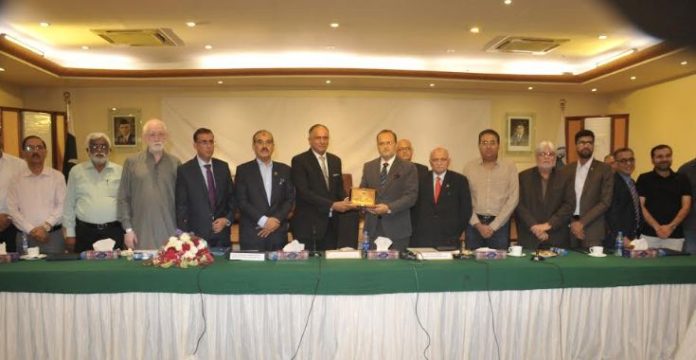KARACHI, OCT 30 /DNA/ – Pakistan’s High Commissioner to Maldives Faisal Rasul Lodhi, while highlighting the potential for enhanced trade ties between Pakistan and the Maldives, assured to strive exponentially to improve the existing trade volume between the two countries by exploring more business opportunities and identifying new avenues of enhanced cooperation.
“It is discouraging to note that the trade volume between Pakistan and the Maldives is only around US$8 to US$9 million. However, there is significant potential for improvement. The current environment is favorable for Pakistan, as there is a strategic opportunity to strengthen ties with the Maldives, especially since the current Maldivian government is quite pro-Pakistani”, he added while exchanging views at a meeting during his visit to the Karachi Chamber of Commerce & Industry (KCCI).
Senior Vice President KCCI Zia ul Arfeen, Vice President KCCI Faisal Khalil Ahmed, Former Presidents Majyd Aziz and Iftikhar Ahmed Sheikh along with KCCI Managing Committee Members were present at the meeting.
Pakistan’s High Commissioner, while commending KCCI for its valuable inputs to strengthen trade relations between the two countries, stated, “For me, this serves as a to-do list that highlights potential areas where we need to collaborate as a team to enhance our current trade and investment ties.”
He was of the opinion that although the Maldives is a small country with an economy primarily based on tourism and fisheries, the business community in Karachi needs to understand that everything the Maldivians use in their daily lives is imported. Pakistan has the potential to export a variety of high-quality items at competitive prices to the Maldives, which are currently being supplied by Sri Lanka, Bangladesh, and Thailand. “Although the Maldives is located far from Pakistan, there are ways to mitigate transportation costs including a Free Trade Agreement and providing high-quality goods at competitive prices. By doing so, we can effectively compete with countries that are closer to the Maldives and have a significant presence in its market”, he added.
The High Commissioner assured to make every effort to enhance trade relations with the Maldives by identifying products that could prove mutually beneficial, and fully facilitating B2B, B2G, and G2G interactions. “We have a lot of potential. I will continue to work closely with you, and I am just a call away. Together, we can work towards establishing a more rewarding situation.”
Earlier, Senior Vice President KCCI, Zia ul Arfeen, while warmly welcoming Pakistan’s High Commissioner, noted that despite strong brotherly ties between Pakistan and the Maldives, bilateral trade remains low and needs to be elevated to a more reasonable level, given the immense potential that exists between the two countries. He emphasized the importance of diversifying trade to enhance exports and seize the available opportunities.
Zia ul Arfeen pointed out that Pakistan’s coastal belt is ideal for palm oil plantations. By implementing a sustainable palm oil strategy, Pakistan could benefit from the Maldives’ expertise in palm oil cultivation, thereby reducing its import bill. He added that with extensive mineral resources, including large reserves of coal, rock salt, pink salt, and copper, Pakistan is well-positioned to support the global energy transition. The Maldives, which relies heavily on imports of mineral fuels and mineral oils, can enhance its bilateral trade by exploring Pakistan’s rich mineral resources.
He stressed the need for both countries to improve people-to-people contact, exchange trade delegations, and participate in each other’s exhibitions. This collaboration would lay the groundwork for improving bilateral trade and fostering closer economic ties, ultimately boosting business collaboration and supporting economic integration.
Zia ul Arfeen also highlighted that climate change presents a global challenge that has increased economic vulnerabilities. Both nations can collaborate on joint adaptation strategies, renewable energy initiatives, and share best practices in coastal protection, disaster resilience, and sustainable agriculture. Such a partnership could enhance eco-friendly tourism and help reduce the carbon footprint, encouraging investments in climate-resilient infrastructure between the two countries.

















